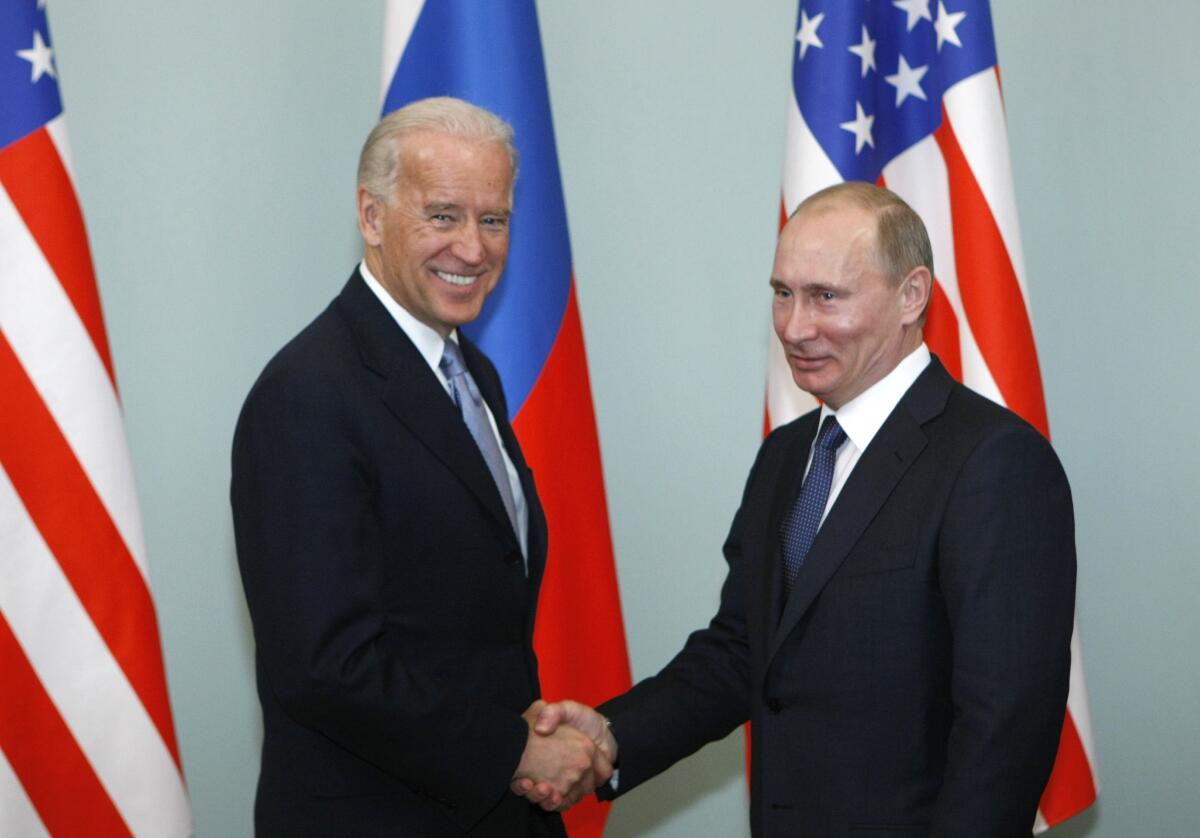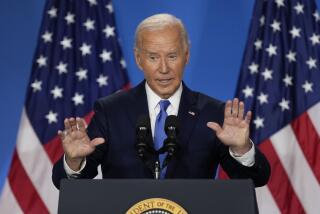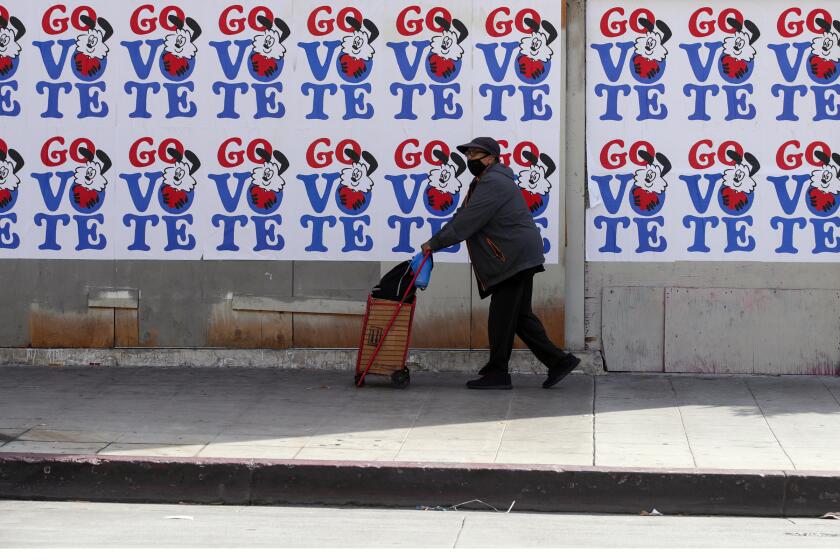Opinion: Russia wants Biden to dance the tango with Putin. What to expect from their summit

In less than a week, President Biden and Russian President Vladimir Putin are slated to meet in Geneva. Defending the summit, which is scheduled for Wednesday, U.S. national security advisor Jake Sullivan pointed out that there can be no substitute for a face-to-face meeting, especially considering that Putin “has a highly personalized style of decision-making.”
The last time Biden spoke to Putin in person was 10 years ago in Moscow, and it was unforgettable. The media like to recount the moment when then-Vice President Biden looked into the eyes of then-Prime Minister Putin and said: “I don’t think you have a soul.” It was a reference to the remarks made by former President George W. Bush in 2001, who said after meeting Putin that he was “able to get a sense of his soul.”
It was even harder to believe when Biden, after becoming a president, called the Russian leader a “killer.” The decision of the American president to look again into the eyes of the man he views as a soulless killer raised questions in the U.S. Critics are concerned that Biden, who was the one who proposed a face-to-face meeting, is rewarding Putin with a prize he doesn’t deserve in light of ongoing Russian aggression.
“A summit tends to reinforce the idea that Russia is still a superpower that can force the U.S. to make concessions. Inside Russia, this will create an impression that the U.S. tries to isolate Russia, but in the end, they can’t do it; they are still afraid of Russia and still need it,” said David Satter, a Foreign Policy Research Institute senior fellow and a Russia expert, in an interview.
So far, the summit does appear to benefit Putin’s interests. Recently, Biden seems to be more accommodating toward Russia than expected for a person who promised “to stand up to autocrats like Putin” while running for president. In May, he decided to waive sanctions on Russia’s Nord Stream 2 gas pipeline, allowing the country to complete construction of the pipeline by the end of the year. Biden’s decision disappointed Ukraine, a vulnerable U.S. ally, as Nord Stream 2 will allow Russia to ship gas directly to Europe, bypassing Ukraine and depriving it of significant revenue.
Since taking office, Biden has added to an already long list of U.S. sanctions against Russia. He punished around 30 companies and individuals over alleged interference in the 2020 election and the SolarWinds cyberattack, which hit the State Department, Pentagon and many other government agencies. It evidently didn’t deter hackers in Russia; the FBI blames Russian-linked groups for the recent ransomware attacks against Colonial Pipeline and food producer JBS.
Though there is no evidence that the Russian government was involved in the incidents, Biden promised to raise the problem of cyberattacks in Geneva. It looks like the current American leader is not going to accept Putin’s word on the issue as easily as his predecessor, President Trump. “Responsible states do not harbor ransomware criminals,” said White House Press Secretary Jen Psaki on June 2.
Putin will most likely answer Biden by saying that it is the U.S. that doesn’t want to cooperate on cybersecurity. Last year the Russian president offered a “reset” in the U.S.–Russia cyber relationship by signing an agreement not to use cyberweapons first. It will be up to Biden to decide if he wants to collaborate with a partner he doesn’t trust.
Ariel Cohen, a nonresident senior fellow at the Atlantic Council’s Eurasia Center, thinks that it is important for the U.S. to bring the tension between Russia and the U.S. down. “At the same time, Biden should not show weakness, and it is challenging,” Cohen added in an interview. So far, Biden has made some concessions, and now it’s Putin’s turn. Cohen thinks that the meeting will be successful if the leaders present a joint statement afterward on cyberattacks, nuclear arms or hypersonic missiles. However, he is not optimistic about that.
Nuclear arms control is one of the few issues where the countries have been able to find common ground. In February, the U.S. and Russia extended their New Strategic Arms Reduction Treaty until 2026. Yuri Rogulyov, director of the Franklin D. Roosevelt Foundation for United States Studies at Moscow State University, suggested in an interview that further cooperation in this sphere will be the priority on the summit’s agenda. “Russia and the U.S. are countries with the biggest nuclear arsenals in the world; they can destroy not only each other but many other countries. There can be no winners or losers when it comes to the nuclear arms agreement; it is beneficial to all,” Rogulyov concluded.
What Putin made clear is that he doesn’t want to discuss with Biden what Putin considers to be the internal affairs of Russia. Biden promised to bring up human rights abuses. He will likely ask Putin to order the release of Alexei Navalny, a leading critic of the Russian president. But the Kremlin continues to show its determination to restrict the political opposition, regardless of U.S. opinion. On Wednesday, the Russian court outlawed the organizations founded by Navalny, calling them “extremist.”
Biden is in a difficult situation. He is expected to be tough on the Kremlin, but at the same time he wants to have a more “stable and predictable relationship” with Russia. Russian Foreign Minister Sergei Lavrov pointed out that if that phrase means “stable and predictable sanctions,” it won’t work out. “It is not realistic to expect this summit to produce any grand bargains or breakthroughs that might transform the bilateral relationship,” said George Beebe, vice president at the Center for the National Interest, who added in an interview, “But I believe we must talk with our competitors and rivals as well as our friends and partners.”
On Wednesday, Lavrov said that Russia is interested in a positive outcome of the summit, but “it takes two to tango.”
Given the pressure, it looks like Biden has more to lose than to gain from the meeting. But considering that the U.S.-Russian relationship has achieved the lowest point since Cold War (both ambassadors were called back to their home countries this spring), it can be worth it for Biden to look into Putin’s eyes again after 10 years and give it a try.
More to Read
A cure for the common opinion
Get thought-provoking perspectives with our weekly newsletter.
You may occasionally receive promotional content from the Los Angeles Times.










